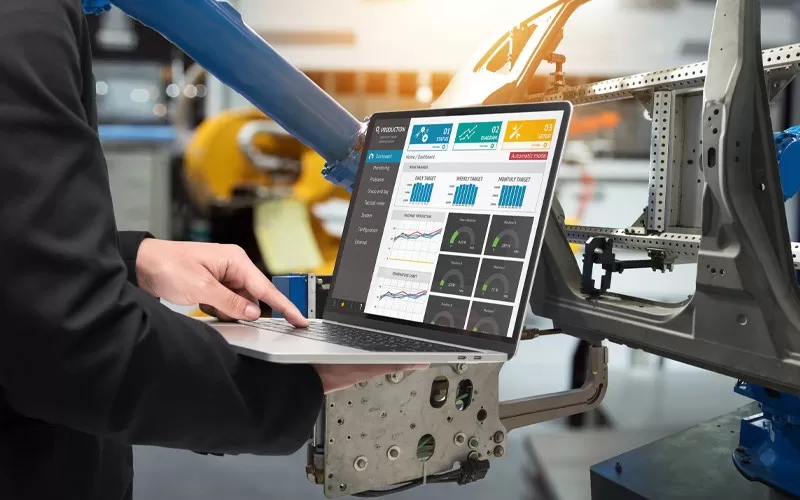Written By:
Scott McAuley
Scott is the IT Director of Texas Management Group, and has been in the IT industry for 25 years.
Managing IT in a small manufacturing operation comes with unique challenges. From limited resources to maintaining system efficiency, Manufacturing IT Support requires a tailored approach to ensure everything runs smoothly.
By following proven best practices, small operations can keep their technology streamlined, secure, and cost-effective. It’s all about making the most of what you have while avoiding common pitfalls.
So, what steps can you take to optimize your IT support and keep things running efficiently?
Let’s explore the 15 essential best practices for Manufacturing IT Support in small operations!
Key Takeaways
- Regular system maintenance minimizes downtime by addressing issues early, keeping your manufacturing operations efficient and cost-effective.
- Automating data backups safeguards your business from data loss caused by hardware failures, cyberattacks, or human errors.
- Scalable IT infrastructure adapts to business growth without disruption, ensuring your technology evolves with your operation’s needs.
- Strong cybersecurity measures, including multi-layered defenses, protect your systems from cyber threats and data breaches.
- Standardizing software and hardware simplifies IT management, reducing troubleshooting time and increasing overall efficiency.
Table of Contents
15 Best Practices for Manufacturing IT Support in Small Operations

Running a small operation requires a smart approach to IT support. The best practices below will help you optimize your IT systems for efficiency, security, and growth.
Whether you’re looking to enhance network performance or streamline day-to-day management, these strategies will keep your business running smoothly.
Here are 15 essential tips to ensure your IT support is top-notch:
| Best Practice | Description |
|---|---|
| Prioritize Regular System Maintenance | Regular checks prevent issues and optimize system performance. |
| Implement Robust Data Backup Solutions | Protect data with automated and frequent backups. |
| Use Scalable IT Infrastructure | Flexible infrastructure adapts to business growth. |
| Ensure Strong Cybersecurity Measures | Multi-layered security defends against cyber threats. |
| Standardize Software and Hardware | Consistency simplifies management and troubleshooting. |
| Optimize Network Performance | Regular assessments ensure fast, reliable connectivity. |
| Train Employees on IT Best Practices | Continuous training reduces risks and enhances productivity. |
| Leverage Cloud Computing Solutions | Cloud adoption increases flexibility and accessibility. |
| Monitor System Performance Proactively | Proactive monitoring detects issues early. |
| Establish Clear IT Support Procedures | Defined processes streamline issue resolution. |
| Manage IT Assets Efficiently | Inventory tracking optimizes hardware and software use. |
| Utilize Remote Support Tools | Remote tools boost efficiency and minimize downtime. |
| Adopt Automation for Repetitive Tasks | Automation reduces manual work and human errors. |
| Regularly Update Software and Firmware | Frequent updates improve security and performance. |
| Collaborate with IT Vendors and Partners | Strong partnerships provide expertise and enhance operations. |
1. Prioritize Regular System Maintenance
Regular system maintenance ensures that your operations run smoothly. By addressing issues early, you avoid unexpected downtime and costly repairs.
Schedule routine checks for all IT equipment to identify potential problems. This proactive approach keeps systems optimized and reduces long-term risks.
2. Implement Robust Data Backup Solutions
Having a reliable data backup system is essential to safeguard your business. It protects your data from accidental loss, hardware failures, and cyber threats.
Automate backups and ensure they happen frequently to minimize data loss. A well-executed backup plan will give you peace of mind during unexpected events.
3. Use Scalable IT Infrastructure
A scalable IT infrastructure supports business growth without significant disruptions. It allows your small operation to expand without overhauling your entire IT setup.
By adopting flexible solutions, your infrastructure can adapt to changing demands. This agility keeps costs down while maintaining efficiency as your needs evolve.
4. Ensure Strong Cybersecurity Measures
Small operations are not immune to cyberattacks, making cybersecurity crucial. Implementing strong security protocols helps protect sensitive business information.
Use multi-layered defenses, such as firewalls and encryption, to secure your systems. A comprehensive cybersecurity strategy minimizes vulnerabilities and enhances protection.
5. Standardize Software and Hardware
Standardizing software and hardware simplifies IT management. It reduces compatibility issues and streamlines updates across your systems.
By maintaining consistency, you enhance the efficiency of your IT support. This approach also makes troubleshooting faster and easier for your team.
6. Optimize Network Performance
Optimizing network performance is key to supporting day-to-day operations. A fast, reliable network keeps your business running smoothly without delays.
Regularly assess your network for bottlenecks and optimize bandwidth usage. Effective network management ensures consistent performance for all users.
7. Train Employees on IT Best Practices
Employee training on IT best practices can prevent common mistakes. Knowledgeable staff are less likely to cause disruptions or security risks.
Offer ongoing training to keep employees updated on the latest IT protocols. Well-trained employees contribute to a safer, more efficient work environment.
8. Leverage Cloud Computing Solutions
Cloud computing solutions offer flexibility and scalability for small operations. It reduces the need for expensive hardware while enhancing data accessibility.
Move essential business functions to the cloud to optimize resources. The cloud allows your team to work efficiently, no matter where they are located.
9. Monitor System Performance Proactively
Proactive monitoring helps catch potential issues before they impact operations. By keeping an eye on system performance, you reduce the risk of unexpected failures.
Use automated monitoring tools to track critical metrics in real-time. Proactive measures lead to smoother operations and fewer disruptions.
10. Establish Clear IT Support Procedures
Clear IT support procedures create a structured approach to handling issues. They ensure that employees know how to report problems and seek help.
Define roles and responsibilities to streamline IT support processes. A well-documented procedure increases efficiency and minimizes confusion.
11. Manage IT Assets Efficiently
Efficient IT asset management keeps track of all your hardware and software. This oversight helps ensure that you are maximizing the value of your technology investments.
Use an inventory system to monitor the lifecycle of your IT assets. Proper management can reduce costs and help plan future upgrades.
12. Utilize Remote Support Tools
Remote support tools allow IT teams to resolve issues without being on-site. This improves response times and reduces downtime for your business.
Equip your IT staff with the right remote support tools to troubleshoot quickly. This convenience enhances productivity and minimizes interruptions to daily operations.
13. Adopt Automation for Repetitive Tasks
Automation reduces the burden of repetitive IT tasks, freeing up valuable time. Automated processes improve efficiency and reduce the chance of human error.
Automate backups, updates, and other routine IT tasks to streamline workflows. Automation also allows your team to focus on more critical aspects of IT management.
14. Regularly Update Software and Firmware
Staying up-to-date with software and firmware updates is essential for security. Outdated systems are more vulnerable to cyber threats and performance issues.
Schedule regular updates to keep everything running smoothly and securely. Consistent updates also improve functionality and reduce compatibility problems.
15. Collaborate with IT Vendors and Partners
Strong relationships with IT vendors and partners can improve your support options. Vendors provide valuable expertise and resources to enhance your operations.
Maintain open communication with your IT partners to address any concerns. Their support ensures that your small operation can tackle IT challenges effectively.
Conclusion
Effective IT support is crucial for small manufacturing operations. By following best practices, such as regular maintenance, strong cybersecurity, and automation, businesses can optimize their systems and prevent costly disruptions.
Prioritizing scalable solutions ensures your IT infrastructure grows alongside your business, while employee training reduces potential errors and enhances productivity.
With proactive monitoring and reliable vendor partnerships, you’ll stay ahead of challenges and keep operations running smoothly.
Ready to take your manufacturing IT support to the next level? Start by applying these strategies today to boost efficiency, security, and long-term success.
Optimizing IT Support for Small Manufacturing Operations is Crucial for Success
Browse our guides for expert advice on implementing effective strategies. Learn how our manufacturing IT solutions can help your business run more efficiently, reduce costs, and improve overall performance.
Book your consultation today to get started!
FAQ
What are the Best IT Practices for Small Manufacturing Operations?
Best practices include regular system updates, proactive monitoring, data backups, and investing in scalable solutions.
How Can I Optimize IT Support for a Small Manufacturing Business?
Optimize IT support by outsourcing to experts, automating routine tasks, and focusing on cost-effective, scalable solutions.
What Role Does Data Management Play in Manufacturing IT Support?
Data management is crucial for accurate production tracking, inventory control, and decision-making in manufacturing.
How Can Small Manufacturing Firms Ensure IT System Security?
Ensure security by implementing strong encryption, regular system updates, employee training, and proactive threat monitoring.






